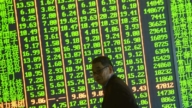【新唐人2014年04月04日讯】日前,一份报告显示,去年,中国五大国有银行的“新增不良贷款”总额,达到468亿3100万元,是前年(2012年)的3倍。而去年五大国有银行的“债务减记”规模,高达人民币590亿元,比前年增长120%,创下十年来最高水平。那么,造成中国银行业不良贷款攀升的原因是什么?银行不良贷款、和债务减记规模飙升,预示着甚么?另外,中国经济增速的放缓,对债务重重的银行业,是否雪上加霜?我们来听听专家的分析。
据《腾讯财经》网站4月2号报导,去年,大陆12家上市银行的年报数据显示,中国五大国有银行的“债务减记”规模高达人民币590亿元,比2012年增长120%,创下十年来最高水平。
而美国《华尔街日报》3月31号刊文说,中国最大的五家国有银行,去年加大了坏账冲销力度,据推算,去年这五家银行冲销和转移到表外的“不良贷款”,共计人民币639亿2000万元(合105亿美元),是2012年冲销规模的2.5倍。
美国南卡罗莱纳大学艾肯商学院教授谢田:“减记规模飙升,或冲销坏帐越来越多,说明中国这些国有银行的经营遇到了极大的麻烦。”
这五大国有银行,分别是中国工商银行、中国建设银行、中国农业银行、中国银行和中国交通银行。
美国“南卡罗莱纳大学艾肯商学院”教授谢田表示,由于国有银行大规模的放贷,大笔的资金都进入到不良的贷款和坏帐里,使国有银行去年下半年就出现了流动性危机的“钱荒”。
去年的中国财报显示,五大银行去年“新增不良贷款”总额,达到468亿3100万元。而前年(2012年) 的“新增不良贷款”仅109亿5200万元。
不少投资者认为,由于国企管理的不透明,五大行的不良贷款或许要比官方数据高出许多。
“中行”行长陈四清对外表示,今年有27%地方融资平台类的贷款到期,而产能过剩行业的贷款为1,885亿元。这是否预告了将有更多的放贷款无法收回﹖陈四清说,今年将高度关注地方融资平台、和产能过剩行业,以及房地产行业,这三大类贷款的资产质量。
谢田表示,银行的收入是从存、贷款人民币差上来的。
谢田:“中国实质上,民间消费贷款一直没有增大很大的规模,大部分都是企业贷款,而企业贷款,随着中国经济走向停滞、或产业过剩,许多产业倒闭,再加上现在房地产泡沫破灭,这些贷款都变成了呆账,这就是这些坏帐增加的原因。”
据媒体报导,中国GDP增速从2007年的13%,下滑到2013年的7.7%。今年2014年第一季度的GDP,可能会降到7.3%左右。
《华尔街日报》说,经济增速放缓,拖累了很多公司偿付债务的能力。
中国国内公司债市场3月份出现首例违约,总部位于上海的“超日太阳能科技股份有限公司”,未能偿付人民币8,980万元的利息。
此外,房地产开发商“浙江兴润置业投资有限公司”表示,公司无法偿还6亿美元的银行贷款。
大陆金融分析师任中道:“一旦回收不了了这个贷款,(银行)它就要从它所谓的利润中冲消掉,对银行的冲击首先就是利润减低,中国经济如果下滑的更加严重,那银行的不良贷款就会不断的增多。”
大陆金融分析师任中道表示,银行还将承受随之而来的资产贬值,进而陷入危机。
《腾讯财经》指出,经济增速放缓,银行业不良债务减记规模大幅攀升,预示着中国银行业的经营压力将会增大,金融环境恶化。
私募股权顾问公司Towson Capital的合伙人杰弗里•道森(Jeffrey Towson),和“麦肯锡全球研究院”亚洲区董事乔纳森•沃泽尔(Jonathan Woetzel),日前撰文说,大陆银行业正面临着前所未有的压力,一场巨大的金融风暴即将爆发。
采访编辑/易如 后制/李勇
China´s Bank Industry In the Eye of the Storm
Recently, a newly released report revealed that in last year,
“newly added bad loans” of China´s five state-owned banks,
reached 46.831 billion RMB (US$ 7.4 billion),
three times that of 2012.
The debt write-downs (reduction in book value of assets)
of five banks,
are up at 59 billion RMB, an increase of 120 percent
comparing it to2012.
This makes it the highest on record in the
last decade.
So what´s the reason for soaring bad loans in China´s
bank industry? What does the situation indicate and mean?
In addition, will the slowing down of the Chinese economy
aggravate the bank industry with serious debts?
Let´s follow the experts´ analysis.
According to Tencent´s Financial website report on Apirl 2,
the annual report of 12 public listed banks in Mainland
China last year,
revealed debt write-downs of China´s largest
five state-owned banks,
had reached 59 billion RMB with an annual
increase rate of 120 percent.
This takes it to its highest levels in the last decade.
US-based Wall Street Journal reported on March 31,
China´s five largest state-owned banks are to strengthen
their efforts on offsetting bad loans.
It is estimated that the bad loans written down and moved
beyond the financial sheets,
had reached 63.92 billion RMB (US$10.5 billion),
as much as 2.5 times more than that of 2012.
Professor Frank Xie from the School of Business Administration,
University of South Carolina Aiken:
“The soaring write-downs and offsetting of more bad loans,
indicates Chinese state-owned banks,
are experiencing major issues within their operations.”
These five state-owned banks include, Industrial and Commercial
Bank of China (ICBC),
China Construction Bank (CCB), Agricultural Bank of China (ABC),
Bank of China and Bank of Communications.
Prof Xie says, due to offering large-scale loans
from these state-owned banks,
huge amounts of money becomes bad loans and bad debts,
which then produces the “money famine” or liquidity crisis
occurring among state-owned banks in the last half of this year.
China’s state financial report from last year, shows that
five banks have a total “newly added bad loans”
of 46.831 billion RMB,
yet when compared to 2012, it was 10.952 billion RMB.
Many investors think, considering the opaque management
of state-owned enterprises in China,
the bad loans of these banks, may well be much higher
than the official data given.
The CEO from the Bank of China Mr Chen Siqing expresses,
around 27 percent l of all local governmental financing
platform loans, will expire this year,
and loans for the industrial sector, will be in excess production
capacity of 188.5 billion RMB (US$ 30 billion).
Does his saying indicate that there will be more loans that
are going to be difficult to retrieve?
Chen Siqing says, in this year alone, the assets exist within
three loan categories,
including local governmental financing platform, industries with
excess capacity and property the development industry,
all of these sectors will be closely watched over in the
ensuing months ahead.
Prof Xie says, the revenue of banks come from the interest gaps
between deposits and loans.
Prof Xie: “But essentially, non-governmental loans
have not yet been developed into a vast quantity.
A considerable amount come from the loans of enterprises.
However, along with the stagnant status of China´s economy
or excess capacity of some industries, many enterprises go bust.
In addition to the broken bubbles of the property industry,
all of these loans will become dead accounts, which is the
main reason for the increase in bad debts.”
According to media reports, the increase rate of China´s GDP
(gross domestic product),
has slowed down from 13 percent in 2007 to 7.7 percent in 2013.
In the first quarter of 2014, the GDP increase rate might well
be further reduced to around 7.3 percent.
Wall Street Journal reported, the slowing down of the economy,
will impact upon the capability of repaying debts of many companies.
The first contract-breaking case, happened in China´s company
bond market in March.
Shanghai Chaori Solar Energy Science & Technology
Company Ltd,
was unable to repay the interest of its bond,
with an amount owing of 89.8 million RMB.
In addition, Zhejiang Xingrun Real Estate Company,
as a real estate developer,
says their company cannot repay the bank loan
of 600 million US dollars.
Mainland financial analyst Mr Ren Zhongdao:
“Once the loans can not be returned,
then the banks will have to offset them from their profits.
So the impact upon the bank, will be to first reduce the profits.
If China´s economy goes further down in to dept,
then the bad loans will be much worse.”
Ren Zhongdao says, banks will also bear the consequent
devalued assets and hence be plunged into crisis.
Tencent Finance points out, slowing down the economy, largely
produces the rising of write-downs of bad debts,
which indicates, the operation stress of China´s banking industry,
will increase and the financial environment will deteriorate.
Private equity consulting company Towson Capital´s partner
Jeffrey Towson and Mr Jonathan Woetzel of Asia Director
of Mcikensy Global Institute, jointly published an article,
which says, bank industry in Mainland is facing unprecedented
stress and a massive financial storm is forthcoming.
Interview/Yi Ru Post-Production/Li Yong



























